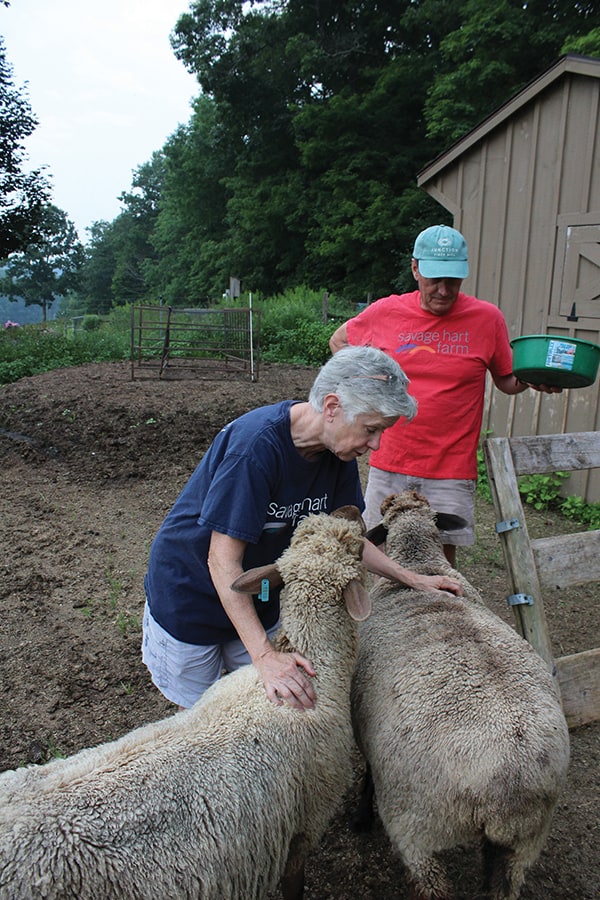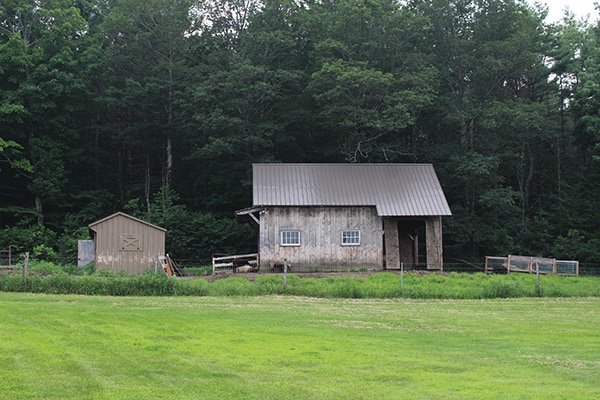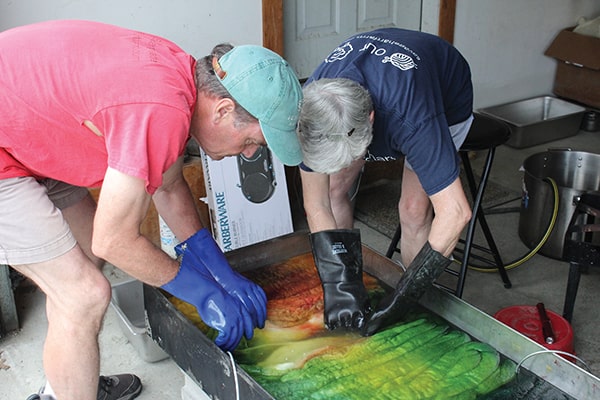 Episode no. 3 of My Side of the Mountain — overlooked stories of everyday life in the Green Mountain State. 10-minutes.
Episode no. 3 of My Side of the Mountain — overlooked stories of everyday life in the Green Mountain State. 10-minutes.
https://omny.fm/shows/my-side-of-the-mountain/sheep-farming-and-vertical-integration
By Ethan Weinstein
It started as a joke: What if we had a sheep farm? Nine years later, Peg and Todd Allen know sheep. They raise lambs — “the finest colored Corriedales in New England” — produce yarn, and now, they even own a fiber mill.

The Allens attract their sheep with a bowl of grain on their farm in Hartford.
In 2012, the Allens purchased 32 acres in Hartford to start their sheep farm, Savage Hart Farm. Empty nesters, the couple sought a new adventure, and after living successful lives in the suburbs of Boston, New York and Chicago, they knew they wanted to be in Vermont.
The early years tested their patience. When the Allens left their fence un-electrified, they enabled escapees. “We hadn’t been here six weeks in Vermont, and we were knocking on doors asking, ‘Have you seen our sheep? Have you seen our sheep?’ I ended up calling the Hartford police [who asked] ‘Ma’am, what do they look like?’ I mean, I felt ridiculous,” Peg remembered.
As a new parent to lambs, Peg was at first overbearing. After the farm’s first birth in April 2013, the Allens sent out an SOS to the Vermont Sheep and Goat Association listserv. Louise Nunan Taylor, a sheep farmer in Norwich, answered their pleas.
“She shows up with her onesie Carhartt, looks at us like we don’t know how to dress in Vermont, and then goes up to the shed, which is where our lamb was, opens up the door, and she says, ‘Oh my God, this lamb is perfectly healthy!’” Peg said. “It’s taken me several years to stop overthinking it. I get very anxious at lambing.”

The Allens’ sheep are free to roam in and out of the barn, but are now protected by electric fence.
Peg and Todd continued working other jobs while Savage Hart got off the ground. But the farm ignored the rigidity of their 9-to-5’s. Todd was mid-board meeting when he got a text from Peg: she needed him at the farm ASAP. “I literally got up and said ‘Sorry, I’ve got to go.’ I sent an email back to one of the board members — who now is the CEO of the bank — and I said, ‘You know, I’m sorry. We had a lambing problem going on; I had to go.’ And he said, ‘Totally get it.’”
This sense of community, of understanding, allowed the Allens to learn their trade, progress, and become mentors themselves. Now, they want to integrate further into the sheep farming community. Last year, they opened Junction Fiber Mill in White River Junction, a top-quality, custom wool processing mill.
For the mill, Peg teamed up with Amanda Kievet, who had helped at Savage Hart since 2019. They purchased Hampton Fiber Mills in Richmond and moved the equipment to a 3,000 square foot space in downtown WRJ. Together, Peg and Kievet operate the mill. “It’s one thing to be a mill owner. Totally different to be a mill worker. I don’t wear any jewelry anymore. It’s a lot of fast moving equipment with sharp objects on them. But we’re making some beautiful, beautiful yarn and the response from the area sheep farmers has been just fantastic,” Peg said.

Tod and Peg Allen experiment with a new color dyeing process for wool.
A year in, Junction Fiber Mill is already booking orders several months in advance. Their clients span the Northeast, from farms in Martha’s Vineyard and Maine, to many nearby in Vermont and New Hampshire.
“We’ve vertically integrated,” Todd said with a smile. The Allens raise sheep from lamb to yarn, and they do so while minimizing waste — they slaughter rams to make sausage, which they sell at nearby stores like Dan & Whits. And the rams’ fleeces are turned into sheepskin rugs and sold at the Norwich Farmers’ Market.
“We’ve had joys and stupidity and tragedy,” said Peg.
“But much more the former than the latter,” Todd was quick to add. “This has been humbling and enjoyable and a real adventure.”



